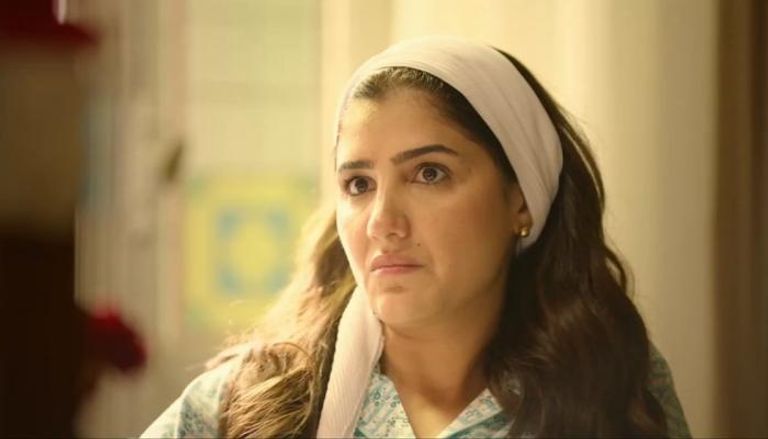This post is also available in: Français (French) العربية (Arabic)
Chadia Khedhir
During the first half of the month of Ramadan, the series Neama al-Avocato (Neama the Lawyer) made it to the list of the most-watched shows on multiple viewing platforms. The show tells the story of a married couple who differ from each other in every way. Neama Said Abu Alab is a lawyer in the Court of Appeal and the State Council. Her father, her role model, is an experienced lawyer himself. As for Salah, her husband, he works in a small shop. His mother, Nawal, is always nagging, complaining about everything.
From love to revenge
 This show is not the first collaboration between actress Mai Omar and director Mohamed Sami, who are married in real life. They previously worked together on the series Nasl al-Aghrab (Outsider Bloodline) in 2021 with the stars Ahmed el-Sakka and Amir Karara. Neama al-Avocato was written by Mohab Tareq and Mohammed Sami and features actors Ahmed Zaher, Arwa Gouda, Kamal Abu Raya, and Tariq al-Nahry.
This show is not the first collaboration between actress Mai Omar and director Mohamed Sami, who are married in real life. They previously worked together on the series Nasl al-Aghrab (Outsider Bloodline) in 2021 with the stars Ahmed el-Sakka and Amir Karara. Neama al-Avocato was written by Mohab Tareq and Mohammed Sami and features actors Ahmed Zaher, Arwa Gouda, Kamal Abu Raya, and Tariq al-Nahry.
The director continues his work on the themes of good and evil, choosing revenge as his favorite dish around which to set up stories. He is artistic in his depictions of the different forms of revenge that Neama chooses for her husband after she goes from giving him absolute love and support to getting revenge upon discovering that he had betrayed her.
The dramatic plot mixes comedy and melancholy and leads viewers to discover the reasons why the couple’s relationship is so weak, how the love story transformed into a nightmare dominated by the desire for revenge.
From the very first scenes, the director introduces viewers to a great contradiction: on one hand, Neama, who is a veritable light full of life and vitality—one of the best roles that Mai Omar has ever played—and on the other, her husband Salah (played by Ahmed Zaher), who is dull, broken, shaken on the inside.
Salah and Neama live together in one house but are wildly different in their intellect, social lives, and choices—in their professions, in their psychological makeup. Salah has one friend, his co-worker in the shop, and even he was imposed on him by work. Salah has no social circle outside this one friend: no companions, no relatives, no other relationships, an indication of his inability to build social and family bonds. It’s like he’s standing on one foot, searching for a lost balance. Other elements also add to this already dubious character, such as his sense of brokenness, helplessness, and failure.
Neama, a woman successful in her choices
Then there’s Neama, the lawyer standing firmly on her own two feet, supported by her family and friends. She is kind and generous; she shares her love, ideas, and fun spirit with the people around her. Her interactions with others are spontaneous.

People are always in orbit around Neama. She is the center around which the stories unfold. She is her father’s student, and she even almost surpassed him. He sees in her some compensation for how harsh life is, and her friends see her as someone to confide in, someone who can hold their secrets. As for her clients, she is the key to relief, the provider of solutions, and their savior from the darkness of prison. She attributed meaning to each of these characteristics, which she earned for herself, step by step. She understands this and is keen to preserve it.
Like many women, this life didn’t come to her on a silver platter. She was the one who invested in herself and her work, she worked hard and overcame all obstacles. Hers is a difficult path that not all women might choose, but why do women have to pay so much for following this journey?
Neama was not wrong when she chose not to be just anybody in the law profession. She excelled in the field and outdid not only her peers but even her professor and mentor, Khaled al-Ashqar. Should she have hid her success from her husband Salah, who keeps going in vicious circles of failure and defeat, most of which he is responsible for himself? Of course not. Neama should not have to lower her ambitions for fear of doing better than the set level of possibility that society allows. Salah has imprisoned himself in this very dynamic, and he is unfortunately the result of such a society that doesn’t accept a female partner’s success and considers it to belittle the man.
Jealousy to avoid confronting failure
Over the course of the series, viewers discover the masks that Salah successively puts on and takes off, revealing how jealous he is and how inferior he feels to his wife.
In the first episodes, all dialogue between the spouses is dominated by one single obsession: the husband’s feeling of helplessness and failure, juxtaposed with the wife’s attempts to encourage and motivate him despite the work she has to do for her clients’ difficult cases. Her exhaustive searches into the minutiae of her clients’ cases contribute to how attractive her personality is, but this sparkle disappears when she’s with her husband. Her light is quickly extinguished and she goes from a lawyer to a woman trying to satisfy her husband and make him happy, even if it’s at her expense.
For example, Neama leads her husband to believe that he’d won an old endowment case, and she gives him a portion of the money she earned on a major case for businessman Yassin al-Alfy, making Salah rich. Neama hopes that this would help her rid her husband of his inferiority complex, but the opposite occurs, and he reveals his true face: a hidden hatred and jealousy of his wife’s professional and social success.
He continues to humiliate her, considering her to be the reason for his sense of failure throughout their marriage. In any case, Neama should not have given her husband the money, as this reinforces the stereotype about the relationship between a couple and women’s status in relation to men’s.

Jealousy and this belief that there is a set limit for professional and social success which women should not surpass so as not to embarrass their husbands is the reality for many women in our region.
This is what was embodied in the dramatic works of male directors such as Abdelhamid Bouchnak in the series Kan Ya Ma Kansh and Ragouj, in which women are the drivers of events and are superior to the male characters. This is also the case with Sandra Hüller, the protagonist in the film Anatomy of a Fall, which received many awards, notably the Palme d'Or at the Cannes Film Festival. The movie’s director Justine Triet excellently dissects the nature of the relationship between a couple, both of them writers.

The wife is successful because she is committed and perseveres, but his laziness causes him to lose whatever success and prestige he’d had among accomplished writers. He chooses to play the victim instead of confronting the real reasons for his failure, and he blames his wife for everything he went through, sometimes even claiming she’s too preoccupied with their son, too selfish, or too little interested in him. But these are all justifications to avoid facing up to his own failure.
It's important for cinema and dramas to dissect the complex nature of dynamics between men and women, especially as relates to jealousy, and to explain the complicated ways these dynamics are informed by patriarchal ideas and upbringing by laying bare the resulting conflicts.































